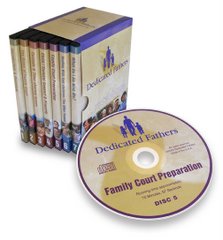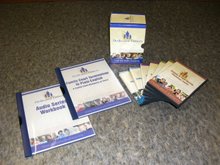Parental Alienation (part 1)
www.dedicatedfathers.org
BY: Marvin L. Chapman
Within the mental health field there continues to be an ongoing debate as to whether or not there is such a thing as parental alienation. Some research appears to support the notions behind parental alienation and its effects on children, and yet other research appears to refute it. However, for those of us in the trenches - especially those of us who have spent years in the family court arena - there is no doubt about parental alienation and its consequences.
Parental alienation is generally defined as one parent repeatedly and continuously programming or brainwashing their child against the other parent. Parental alienation may include such acts as obstructing, interfering or outright denying the child’s right to spend time with the other parent. It usually includes statements that the other parent does not care about the child, is too busy for the child, or similar statements all used to coerce the child into believing the other parent and even their extended family do not love the children or care about them anymore. Such begins the breaking down of the parent-child relationship. In its worst form, parental alienation involves false allegations of abuse, neglect, or some other form of alleged harm to the child.
Of the research I have read, most of those opposing the notion of parental alienation have a clear bias towards mothers. This is not surprising given the fact the mother is almost always the parent who attempts to alienate the children, very seldom the father. Those who oppose the notion of parental alienation overwhelmingly state that if there is any real alienation, then it comes from the fathers’ own actions and not due to any wrongdoing on the part of the mother. It appears to me that those who buy into the notion only mother’s can nurture and care for children also buy into the notion that mother’s would never purposefully and systematically alienate the children against their father.
In over 26 years within the family courts, I can categorically state parental alienation is very real in family law. Anyone spending half a day in any family court will clearly see the systematic alienation that is perpetrated in many cases (but then going to court and finding out what really goes on is NOT scientific study - it’s REALITY). Some form of parental alienation is in about fifty percent (50%) of all of my cases as indicated by the following:
The number 1 complaint of all fathers I have seen in over 25 years is that the mother is causing interference, obstruction and denial of their children’s right to spend time with the father.
The number 2 complaint of all fathers I have seen in over 25 years is that the mother is repeatedly and continuously making degrading and derogatory remarks about the father either directly to the children, or at the very least within hearing distance of the children.
The number 3 complaint of all fathers I have seen in over 25 years is that the mother prevents or severely limits the father from having any significant say in the lives of their children as to health decisions, educational decisions, extra-curricular activities and other general welfare decisions - actions which are made solely and unilaterally by the mother.
As stated above, I have found some form of parental alienation in about fifty percent (50%) of all of my cases for over 26 years as outlined above. Therefore, for me and my clients, parental alienation is extremely common. No only are these acts alienating the children, I support the notion that such acts rise to the level of child abuse. It is abusive for one parent to interfere, obstruct or denial children their right to spend time with the other parent. It is abusive for one parent to continuously make degrading and derogatory remarks about the other parent, whether directly to the children or within hearing distance of the children. And it is abusive for one parent to make sole unilateral decisions about the children without any significant input from the other parent - basically cutting the other parent out of the decisions making process for their children.
Unfortunately, what I call child abuse, family court judges call “primary physical custody to mother.” I see hundreds of clients each year and in over half of those cases I hear at least one (1) of the complaints outlined above. Extrapolate those numbers to the general population and we can only guess at the real number of children being abused through the alienation action of their mother.
The reasons one parent alienates the children against the other parent are as varied as the parents’ themselves. However, there are some attributes which have been identified as being the driving force behind alienating behavior, which are the following:
1. Alienating parents may have feelings of abandonment, anger and rage at the other parent;
2. Alienating parents many times are seeking revenge for perceived wrongs;
3. Alienating parents may have acute or chronic psychological and/or emotional problems;
4. Alienating parents typically harbor resentment from events that happened during the marriage;
5. Alienating parents can be over-enmeshed with their children, resulting in over-protectiveness; and
6. Alienating parents may have an overwhelming need to “prove” they were right and the other parent was wrong.
Likewise, some children are more susceptible to alienation than others and there are some attributes which have been found to be common among children who succumb to alienation tactics, which are the following:
1. Children with a strong psychological bond with the alienating parent;
2. Children with an excessively dependent relationship with the alienating parent;
3. Children who live in fear of losing the alienating parent’s love and support;
4. Children who become overly protective of the alienating parent - sometimes taking on the role of a surrogate spouse (taking “care of” the alienating parent); and
5. Children who respond positively to outside encouragement for expressing their feelings of being abandonment or rejection by the alienated parent.
Please check back next week for part 2 of this article on Parental Alienation.
Be sure to visit our website for more information on divorce and child custody.
www.dedicatedfathers.org
Wednesday, June 27, 2007
Parental Alienation (Part 1)
Posted by
Dedicated Father
at
7:19 PM
189
comments
![]()
Labels: child abuse, child custody, child support, children, divorce, divorce coach, divorce mediation, family court, fathers rights, kids, parental alienation, parenting rights, paternity
Monday, May 21, 2007
Robert and Rob EQUAL parenting bike trek!
Fathers to ride over 600 miles for Equality in Parenting Rights!
From daddyblogger.com
It is official! August 11th 2007 Robert Pedersen and Rob Mackenzie will start their over 600 mile bicycle trek from the Lansing Capitol to Washington, D.C.. This will be an intense multi-day bike trek through numerous states ending in Washington, D.C. where they will be greeted by thousands of people attending the national rally in Washington, D.C. on August the 18th.
It is simply amazing that two fathers are going to attempt this trip all in the name and support of shared parenting! They do this to protect a child's right to EQUAL time with BOTH fit parents! Many elected officials and supporters will see the riders off at the Lansing Capitol and thousands will greet them in Washington, D.C.
Follow this link for the entire story:
http://daddy.typepad.com/daddyblog/2007/04/robert_and_rob_.html
www.dedicatedfathers.org
Posted by
Dedicated Father
at
7:51 PM
4
comments
![]()
Labels: child custody, child support, children, dads, divorce, divorce coach, equal rights, family court, kids, parent, parenting rights
Friday, May 18, 2007
Family Court: Preparing for your Divorce Case
Preparing Your Divorce Case
www.dedicatedfathers.org
Step 1: KEEPING A JOURNAL
Immediately upon knowing you will be going into family court (or when you think you are heading into family court), one of the first and most important things you need to start doing is keeping journal of all significant events concerning you, your children, your finances and the other parent.
More often than not, each time you go to your divorce or child custody hearings you will need to provide a statement as to specifically what you want and justification for why you should get it. This written statement is called your “declaration.” The information in your declaration is taken directly from your written journal as outlined above.
In family court, some judges will not listen to what you have to say verbally. They will rely totally on what you have written in your papers and what the other parent has written in their responsive papers. Therefore, writing your declaration may be a very critical part of whether or not you get what you are asking for, which makes your journal entries extremely important to your case.
Step 2: PREPARING TO WRITE YOUR DECLARATION
Stay away from bringing up negative issues about the other parent, it usually makes you and not the other parent, look bad in the eyes of the court. However, many times in response to issues raised by the other parent, you will need to respond by bring up negative issues. Likewise, many times the only way to show a substantial change of circumstances affecting the best interest of your child is to bring up negative issues about the other parent. However, be very careful in the way you bring up those negative issues.
Only bring up negative issues IF you can show, demonstrate or prove how it directly affects your child or your relationship with your child - otherwise, leave it alone.
The cardinal rule of bringing up negative issues is that you always, always, always, label the negative issues as “CONCERNS.” Example: “I am concerned that every time I go to pick up our child, the other parent is never at home. I believe this confuses our child and allows our child to believe I have not come to see them and do not care about them, which is simply not true and not in our child’s best interests.”
Step 3: WRITING YOUR DECLARATION
Your declaration is simply your very clearly written statement of what has happened, including all dates whenever possible, which clearly provide the court with the reasons and justifications for the order you want the court to make. Every request you make needs to have a reason or justification for it. The judge knows absolutely nothing about you or your case. You need to bring the judge up to speed about your case very quickly (they don’t have much time to review each case, maybe 5 to 10 minutes at most).
Whenever possible, attach proof or evidence which supports what you are writing. If you do not have the proof or evidence, then state where such evidence is located. Some ideas as to proof or evidence may be pictures of you and your children enjoying your time together, statements from witnesses who have seen you interact with your children, time cards showing when you actually work, letters from teachers or church leaders as to your involvement with school and church. Get creative, but be able to back up your claims.
Step 4: THE COURT FILE
You will want to ensure you have an exact copy of the court divorce file, which you can get from the County Clerk at your family courthouse. Your court divorce file is needed so whomever is assisting you can see what has happened so far in your case.
Also, there are many times wherein something which has happened before will prevent you from bringing up the same issues again - a review of your court file will let you know this information. Additionally, there are many times wherein new or different paperwork is required based on what has happened before - again, a review of your court file will let you know this information.
Therefore, you will want to keep and maintain an up-to-date court file at all times.
Step 5: CHILD SUPPORT AND SPOUSAL SUPPORT (ALIMONY)
It is in your best interests to start getting copies of all canceled checks made for any kind of support you have paid and ensure you make copies of both the front and the back of those checks. Additionally, ensure you put on the check itself on the bottom left hand “comments” section that the check is for “child support” or “spousal support.”
IF YOU CAN’T PROVE YOU HAVE PAID IT, YOU OWE IT !
Never, ever pay any type of support in cash. Why? Because there is no way to prove the other parent received the money if you do not have a copy of the other parent’s signature and deposit notations from your canceled check.
Step 6: MAINTAIN ORGANIZED FILES OF EVERYTHING
You will eventually have numerous files about your divorce or child custody case which you will want to maintain and keep organized at all times. Some of the files you will want to keep are as follows:
A) One file for all correspondence with the other parent kept in chronological
order;
B) One file for all correspondence with your attorney and/or paralegal kept in
chronological order;
C) One file for all correspondence with the other parent’s family law attorney kept in chronological order;
D) One file for all correspondence with the state agency collecting support
payments kept in chronological order; and
E) One file of all proof of all payments made for support (including both the front and the back of canceled checks).
Step 7: CONSULTATION WITH AN ATTORNEY AND/OR PARALEGAL
Armed with all of the information as outlined in Step 1 through Step 6 above, you are now ready to consult with a family law attorney, paralegal and or support organization about your divorce or child custody case.
One last thing:
"Not everything that is faced can be changed, but nothing can be changed until
it is faced." ---James Baldwin
By: Marvin Chapman
Order the Dedicated Fathers Audio Series Today!
Posted by
Dedicated Father
at
1:25 PM
87
comments
![]()
Labels: child abuse, child custody, child support, court case, dads, dedicated fathers, divorce, divorce coach, divorce mediation, family court, family court system, fathers rights, law
Thursday, May 3, 2007
Child Abuse, Divorce, and Child Custody
ALLEGATIONS OF CHILD ABUSE
Divorce & Child Custody (part 2)
By: Marvin Chapman
www.dedicatedfathers.org
In the California Family Code Section 3027.1 it states the following:
“If a court determines...that an accusation of child abuse or neglect made during a child custody proceeding is false and the person making the accusation knew it to be false at the time the accusation was made, the court may impose reasonable money sanctions, not to exceed all costs incurred by the party accused as a direct result of defending the accusation, and reasonable attorney’s fees incurred in recovering the sanctions, against the person making the accusation.”
In over 26 years in the family court arena, I have never experienced nor have I ever heard of any judge actually determining someone has knowingly made a false allegation of child abuse.
Pretty amazing fact when you consider the following:
Outside of family court: Independent third parties are generally the ones making the allegations.
Outside of family court: Mothers are found responsible for 49% of child abuse cases (with fathers, other relatives and strangers making up the other 51%).
Inside family court: By an overwhelming majority, it is mothers who make allegations against fathers [even though statistically, the mother has a higher probability of committing abuse (49% of all cases as shown above). This fact is totally ignored in family court.
Inside family court: The vast majority of the allegations can not be verified or validated; however, the father is almost always treated as guilty from day one.
Research shows that upon the accusation of child abuse in family court, the presumption of guilt is taken for granted by the majority of attorneys and judges. Therefore from the onset, an accused father is treated as though he were guilty. As indicated in Part 1 of this Allegations of Child Abuse section, in family court (divorce court) child abuse allegations require no proof, no validation, no verification, no police reports, nor any other tangible evidence - the mere unsubstantiated allegation will do.
Research also shows mothers often obtain sole custody of the children, terminate or severely restrict visitation with the father, then request an increase in child support due to the reduced time the father has with his children. All of these consequences tearing apart the restructuring family, severely damaging father-child relationships, injuring the father emotionally, and many times destroying the father financially. All of this trauma built around unfounded false allegations. With such devastating consequences you would think family courts would be more pro-active in going after those who make false allegations. Unfortuantely for the families involved, not only do the courts not go after those making false allegations pro-actively, they don’t go after them at all!
The author of this article, Marvin Chapman, has a great website devoted to fathers rights and divorce. Why not check it out?
Visit www.unitedfathers.org
Defend Your Rights Today!
Order the Dedicated Fathers Audio Series Now!
Posted by
Dedicated Father
at
7:15 PM
7
comments
![]()
Labels: child abuse, child custody, children, dads, divorce coach, domestic violence, family court, fathers rights, kids, paternity
Sunday, April 22, 2007
Divorce & Child Custody - Child Abuse
Divorce & Child Custody:
ALLEGATIONS OF CHILD ABUSE
Part 1 of 2
By: Marvin Chapman
www.dedicatedfathers.org
www.unitedfathers.org
Research verifies mothers are responsible for 49% of all child abuse cases (with other relatives, strangers and fathers making up the other 51%).
In family court, twice as many mothers make child abuse allegations against fathers as do fathers against mothers.
Therefore, the mother making the allegation of child abuse against the father in a divorce is much more likely to be the perpetrator of the abuse than is the father.
Unfortuantely, the above facts are totally ignored by family courts.
In family court, the normal standards of evidence required for common criminals do not apply. In family court, child abuse allegations require no proof, no validation, no verification, no police reports, nor any other tangible evidence - the mere unsubstantiated allegation will do. Research proves upon the accusation of child abuse in family court, the presumption of guilt is taken for granted by the majority of attorneys and judges. Therefore, in family court, unsubstantiated hearsay allegations of abuse is all it takes for a father to be “guilty,” along with all the consequences which go with that “guilty” verdict. From the onset, the father will be treated as though he were found guilty in a real court.
Because the presumption of guilt is taken for granted by the majority of attorneys and judges in family court, the father will almost immediately be separated from his children - at least until he can “prove” his innocence. How does a father prove his innocence? How does he prove something did not happen? The reality is, he can’t. The very fact something did not happen prevents him from proving the non-happening of the non-event. It is a very well known and accepted fact that you can not prove the non-happening of a non-event - that is, except in family court.
During a divorce, the mere allegation of child abuse can and most of the time will cause an irreparable breakdown of the accused parent-child relationship. At the very least the previously healthy parent-child relationship will be disrupted and interfered with unnecessarily. The accused parent will typically become defensive and in the effort to prove their innocence, they will many times unwittingly distance themselves from their child, which is then used against them as verification of some form of abuse. With false allegations of abuse only the mothers win - fathers, children and father-child relationships all lose in some way or another.
Research also shows that mothers often obtain sole custody of their child, terminate visitation with the father, and then request an increase in child support due to the reduced time the father has with their child. All of these consequences tearing apart the restructuring family and damaging the father-child relationship, destroying the father emotionally, and injuring the father financially, are all built around simple unfounded false allegations and hearsay.
Many times the falsely accused parent is stigmatized and their reputation tarnished by the false allegations. This stigma and tarnished reputation may stay with them even if they are eventually found to be factually innocent. Many innocent men lose their jobs, become depressed and walk away from it all. In today’s fear filled society, the mere allegation of child abuse within family court can damage a person for the rest of their lives. Personally, I have had clients commit suicide over such abuse allegations - even after they were determined to be factually innocent of all charges. They could not take their neighbors, former friends and co-workers continued scorn and ridicule.
Regardless of the dire consequences of destroying a man’s life, false allegations of abuse, both spousal and child, are allowed to continue unabated in family court around this country. What most people seem to miss is the fact that it is the children who suffer the most with false allegations of abuse in that their relationship with one of their parents will be irretrievably impaired. Issues of abandonment, rejection, hurt and an overwhelming sense of loss will accompany most of these children for the rest of their lives.
Whether fiction, fantasy, legal ploy, or some other reason, false allegations of abuse are an indication the accusing parent is at the very least immature and over-enmeshed, and at worse, malicious, vindictive and prone to do anything to make the other parent “pay” for their perceived wrongs.
What makes false allegations of spousal abuse and child abuse so absurd is that when the parents were together, the accused parent was a good, decent and trusted parent. But once the breakup began, the accused parent was magically transformed into a mean, angry, abusing man. Why the family court can not see this fact is beyond any sound logical reasoning.
The use of false allegations of spousal abuse and child abuse will only stop when the standard is raised wherein a parent must prove the abuse, verify, validate and substantiate the allegations. Until then, families will continue to be abused by the very system which alleges concerned about the “best interests of the child.” Abusing a parent through false allegations, treating the falsely accused parent as guilty, making orders emotionally rather than logically and with proof, validation, verification and substantiation, are not and will never be in the “best interests of the child.”
Fathers who only months ago were good care-giving, productive and protective fathers are now child abusers. It is insane the courts even allow most of these cases. A simple third party investigation, short and inexpensive, would prove not only did the alleged abuse not happen, the mother knew her allegation was untrue when she made it. Then, and only then, will there cease to be an incentive for these false allegations to be made in the first place.
Like spousal abuse, child abuse allegations require no proof, validation, verification, police reports or any other tangible evidence - the mere unsubstantiated allegation will do very nicely by itself. Just as in false allegations of spousal abuse, false allegations of child abuse are extremely common in family court. Given the current heightened awareness of child abductions and child abuse nationally, there is a lot of emotions around the allegations of child abuse - and family court is almost totally governed by emotions.
Family court judges are given wide discretionary powers unlike any other area of law. This vast discretionary power of family court judges allows them to make their orders without ever having to justify and without ever giving sound logical reasoning for the orders they make.
Just like false allegations of spousal abuse, the mere allegation of child abuse is a winner for mothers. In the majority of cases, the mere allegation of child abuse will subject the father to parenting classes (money), supervised visitation with their children (more money) and a higher child support order (much more money).
If for any reason you suspect the other parent may make allegations against you, if the other parent has a history of repeatedly getting really angry with you, or if the other parent has ever made other false allegations against you (“You don’t love me anymore.”), then you need to take steps to protect yourself and your children.
The Author of this article, Marvin Chapman, has a great website devoted to father’s rights and child custody. Why not check it out? www.dedicatedfathers.org
Also be sure to visit www.unitedfathers.org
Posted by
Dedicated Father
at
6:56 PM
112
comments
![]()
Labels: abuse, advice, child custody, child support, children, dads, divorce, divorce coach, domestic violence, family court, fathers rights, help, kids, parent
Tuesday, March 27, 2007
ALLEGATIONS OF SPOUSAL ABUSE (Divorce and the Family Court System)

ALLEGATIONS OF SPOUSAL ABUSE
Divorce, child custody, and the family court system
www.dedicatedfathers.org
www.unitedfathers.org
By: Marvin L. Chapman
In family court (divorce court), the definition of spousal abuse is fleeting at best. For over 25 years I have observed spousal abuse as being any time a parent “feels” uncomfortable or “threatened.” This is to say in family court, spousal abuse is the act of making the other party “feel.” Sounds funny? Absurd? Well, go to your local family law courthouse and find out where divorce and spousal abuse cases are being heard and then watch in amazement as you see the stories unfold.
Generally, all a woman has to say is she is in “fear” of the father and a restraining order is immediately placed against the father - no proof, no validation, no verification, no police reports, nothing is required other than “feeling fearful.”
Fact: 1 in 3 women (33%) and 1 in 4 men (25%) will be victims of domestic violence. With such statistics, it makes you wonder why so many women and yet so few men are able to obtain restraining orders for domestic violence. Could it be the institutional bias against fathers is so great in family law that judges just can’t or won’t believe men can be victims of abuse from women? Go to the courthouse, watch what goes on, make up your own mind.
In family court, the mere allegation of being “fearful” of the father will typically get the mother a three (3) year restraining order against the father. Additionally, many cases end up with the father being ordered to parenting classes (money) anger management classes (more money), supervised visitation with their children (even more money) and a higher child support order (much more money). Ever wonder why men feel all they are is a paycheck? Read this paragraph again and see if you can figure out why we feel that way.
In California, part of the formula for determining child support is the amount of time each parent spends with their children. Accordingly, if a mother makes a false allegation of being “fearful” and can get the court to order supervised visitation with the father - she just won the child support lottery. Therefore, mothers in California have a financially vested interest in making false spousal abuse allegations. And this is our divorce system at work.
I have had clients whose spousal abuse cases against them have been thrown out by the District Attorney (DA) as unsubstantiated and/or unfounded, only to have the mother go to family court and get a three (3) year restraining order against the father based on the same allegation which was found to be unsubstantiated and/or unfounded by the DA.
I have had clients who have pleaded with the court to allow them to take lie detector tests to prove their innocence, only to be turned down by the family court judge because the judge had already made up their mind that the father was guilty.
I have had many cases where the father can prove he was at work when the mother was “injured.” However, because the mother had a bruise, the court takes the mother’s word for it and grants a three (3) year restraining order. In many of these cases the mother is so proud of what she pulled off in court that they call the father and laughingly brag to him on how she learned to bang herself into a door jam to get a bruise. For this act, the father is given limited time with child children, pays for anger management courses, pays for a monitor to supervise his visits with his children, and pays a higher child support amount due to the limited amount of time he has with his children.
This is JUSTICE - Family Court Style
Again, in family court, only allegations are necessary - no proof is required, no validation and no verification is necessary for a family court judge to tell truth from fiction in less than 10 minutes. It hurts to admit it but as a trained therapist with over 25 years of experience, without any proof, validation or verification, I am many times unable to tell truth from fiction - no matter how many times I meet with a couple. Yet, in family court, a judge - with no psychological training or experience - can determine truth from fiction in less than 10 minutes.
What a world this would be if we all could be like family court judges and have such powerful insight into human behavior, family functioning and family dynamics that we are able to determine absolute truth within any particular family almost immediately!
Since the mere allegation of spousal abuse makes you guilty, even when totally lacking in proof, validation, verification or evidence, there is no absolute way to protect yourself from these false charges. However, to minimize your chances of being falsely accused make sure you do not in any way provoke a verbal altercation with the other parent. Walk away, go to a hotel, do anything, but do not get into a verbal altercation with the other parent. The next step of an escalating verbal altercation is false allegations of abuse.
I know many readers of this section may have very strong feelings about these issues. As I tell many of my own clients, “Don’t believe me, believe your own eyes and ears.” Go to your nearest family court and watch the divorce and domestic violence hearings. If possible, talk to both the fathers and the mothers involved. Determine truth for yourself.
IMPORTANT DIFFERENCES IN ABUSE ALLEGATIONS
Allegations of spousal abuse (domestic violence) within family court is not the same as allegations of spousal abuse outside family court. Within family court there are emotional battles over the children, hurt feelings, divorce issues, perceived wrongs, financial incentives, and other issues which drive the desire to punish the other parent through false allegations. Other than judges, those involved in family court know the vast majority of claims of spousal abuse within family court are simply false allegations - without any factual foundation whatsoever. Outside of family court, there are few rewards for making false allegations. Accordingly, the vast majority of claims of spousal abuse outside of family court are based on fact with substantial factual foundations.
“FAMILY COURT IS FAMILY ABUSE”
Marvin Chapman, the author of this article, has a great website devoted to fathers rights and divorce information. Why not take a look?
www.dedicatedfathers.org
www.unitedfathers.org
Dedicated Fathers is the ultimate tool to help you defend your rights!
Posted by
Dedicated Father
at
7:53 PM
56
comments
![]()
Labels: abuse, child custody, child support, children, collaborative divorce, court case, divorce, divorce coach, domestic violence, family court, fathers rights, spousal abuse
Ten Things to do for Yourself This Year

Ten Things to do for Yourself This Year
1. Learn to love yourself. You are just as deserving of your love and respect as anyone else is. When you learn to love yourself, you treat yourself better because you know that you are worthy of it.
2. Realize that you deserve only the best that life has to offer. When you know that you deserve the best, you’ll go out and create the best for yourself.
3. Set a goal for yourself and then do what you need to do to reach it. No matter how small the goal, reaching it will make you feel very good about yourself.
4. Learn a new skill. Learning is how we grow and assure ourselves that we are alive and capable.
5. Take time just for yourself every day. Even 15 minutes a day is enough to re-charge your battery. This is not selfish; it is self-preservation.
6. Do something creative. Find a hobby that you enjoy and just do it. Creativity just feels good.
7. Tell the people that you care about how you feel. Never pass up the chance to tell someone that you love him or her. This way, you will feel the pain of regret.
8. Let go of the past. It is gone forever. Learning to live in the here and now is invaluable in making every day the best.
9. Let go of one grievance or prejudice. We all have them, and they are just black holes on our soul.
10. Laugh every single day. One good belly laugh is healing. If you can’t see anything to laugh at, you aren’t looking hard enough.
www.dedicatedfathers.org
www.unitedfathers.org
Get what every father needs to know. Order Dedicated Fathers today!
Posted by
Dedicated Father
at
7:33 PM
4
comments
![]()
Labels: child custody, child support, children, collaborative divorce, counseling, court case, divorce, family court, guidance, self improvement











